Online Distance Learning
-
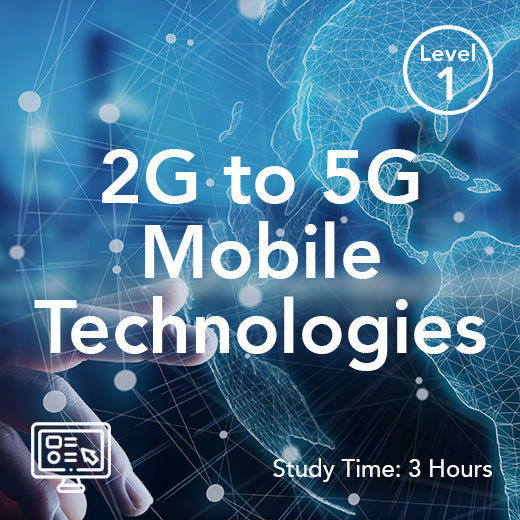
2G to 5G Mobile Technologies (On-Demand)
Our 2G to 5G Mobile Technologies Training Course is designed to provide professionals in the telecommunications industry with the knowledge and skills needed to understand and work with the latest mobile technologies. With the rapid evolution of mobile networks, staying up-to-date with the latest advancements is crucial for professionals looking to advance their careers in this field. Our comprehensive course covers everything from the basics of 2G technology to the cutting-edge developments in 5G networks.By enrolling in our training course, participants will gain a deep understanding of the principles and technologies behind 2G, 3G, 4G, and 5G networks. They will learn about the key features and capabilities of each generation, as well as the challenges and opportunities presented by the transition to 5G. Our expert instructors will guide participants through hands-on exercises and real-world case studies to ensure they have the practical skills needed to succeed in this dynamic industry.Whether you are a seasoned professional looking to upgrade your skills or a newcomer to the telecommunications field, our 2G to 5G Mobile Technologies Training Course will provide you with the knowledge and expertise needed to excel in this fast-paced industry. Stay ahead of the curve and advance your career with our industry-leading training program. This self-paced on-demand distance learning course features illustrated course books, videos, tests and full tutor support. Who would benefit This course is suitable for engineering, technical sales, technical management and other staff who require a general technical overview of mobile technologies but who do not need to invest the time necessary to learn about each technology in depth. Prerequisites A basic understanding of telecoms principles would be beneficial. Topic Areas Include: An overview of basic radio and cellular techniques and technologies Network Generations from 2G to 5G 3GPP Release programme An overview of 2G (GSM) network architecture and functionality GSM TDMA air interface operating principles GPRS and EDGE upgrades to GSM GSM services TETRA networks An overview of 3G (UMTS) network architecture and functionality UMTS WCDMA air interface operating principles HSPA and HSPA+ upgrades to UMTS An overview of 4G (LTE) network architecture and functionality LTE OFDMA air interface operating principles Evolved Packet Core (EPC) operation Small cells and heterogeneous networks Self Organising Networks (SON) LTE voice options LTE Advanced and LTE Advanced Pro Wi-Fi/Cellular interworking LTE operation in unlicensed frequency bands Machine Type Communications (MTC) LTE for public safety Introduction to 5G 3GPP use cases for 5G Performance targets for 5G Radio Spectrum for 5G 5G OFDMA air interface 5G System Architecture Non Standalone (NSA) and Standalone (SA) New Radio (NR) 5G Core Network Functions
£750.00
-

5G Advanced (On-Demand)
5G Advanced On-Demand is a comprehensive course designed to explore the latest advancements in 5G technology, specifically focusing on the enhancements introduced in 3GPP Release 18. This course delves into how 5G Advanced significantly boosts network capabilities, paving the way for future demands and innovations in the telecommunications industry. By understanding the specific features and improvements that 5G Advanced brings to the table, telecom professionals, network engineers, product managers, and individuals involved in strategic planning or technical implementation can stay ahead of the curve and leverage these advancements to drive success in their respective industries. With a concise overview of the enhancements introduced by 5G Advanced, participants will gain valuable insights into how these improvements can revolutionize their current practices and infrastructure. From base capability improvements to specific features unique to 5G Advanced, this course covers a wide range of topics essential for professionals looking to stay informed and competitive in the rapidly evolving telecommunications landscape. Whether you are looking to enhance your technical knowledge or gain a strategic edge in your industry, 5G Advanced On-Demand offers the knowledge and expertise needed to thrive in the era of advanced connectivity and communication technologies. Who Would Benefit This course is ideal for telecom professionals, network engineers, product managers, and anyone involved in strategic planning or technical implementation within telecommunications and related industries who require a concise overview of the improvements 5G Advanced introduces, along with an examination of the specific features and how they enhance their respective industries. Course Contents Introduction 5G Advanced – Base Capability Improvements Specific 5G Advanced Features
£95.00
-
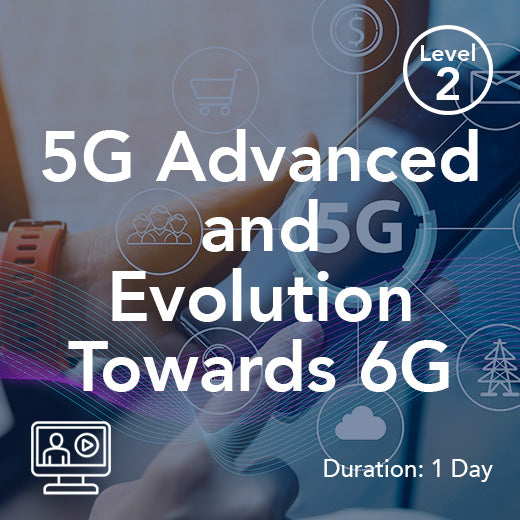
5G Advanced and Evolution Towards 6G
This 5G Advanced and Evolution Towards 6G course delves into 5G Advanced and its role as a stepping stone to the groundbreaking 6G era. You'll explore how 5G is being enhanced to deliver even higher speeds, lower latency, and greater capacity. We'll dissect key features and advancements that are laying the groundwork for the future of connectivity. Beyond 5G, the course will provide a glimpse into the potential of 6G, examining emerging technologies and their implications for industries and society. The course provides a holistic overview of the current (relatively early) state of play of 6G development. We develop crucial insights into 6G design, performance objectives, and its intersection with the metaverse and AI, ensuring participants are well-prepared for the future of wireless communication. By the end of this course, you'll gain a comprehensive understanding of the latestdevelopments in mobile network technology and the exciting possibilities they hold. Who Would Benefit Although this course is open to all, it is recommended that you have prior experience in telecommunications. Course Contents 5G Advanced - Base Capabilities Improvements Specific 5G Advanced Features 6G – a Look Ahead
£980.00
-
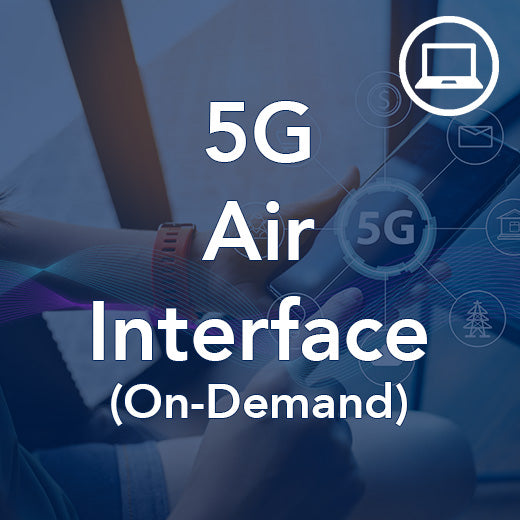
5G Air Interface (On-Demand)
Our 5G Air Interface training course provides a comprehensive technical overview of the air interface for the 5G New Radio (5G NR). This course delves into the principles of millimetre wave and multiple antenna communications, the architecture and implementation of the air interface's physical layer, as well as the higher layer air interface protocols and signalling procedures for both idle and active 5G devices. Ideal for engineers and professionals involved in equipment design, operation, optimization, or monitoring on the 5G air interface, this course assumes an engineering background with some knowledge of general radio principles and digital radio systems. While a basic understanding of 5G and experience with LTE radio systems are desirable, they are not mandatory prerequisites.In addition our course covers a range of topic areas including 5G introduction, use cases, and standardization, radio spectrum and millimetre wave communications, principles and implementation of multiple antennas in 5G, and more. For those looking to deepen their understanding further, we also offer an optional 5G Virtual Lab Module where participants can explore, test, optimize, and troubleshoot the 5G system in a fully emulated environment. This self-paced on-demand distance learning course features illustrated course books, videos, tests and full tutor support. Who would benefit The course is intended for engineers and other staff who are involved with equipment design, operation, optimization or monitoring on the 5G air interface. Prerequisites An engineering background with some knowledge of general radio principles and digital radio systems is assumed. A basic understanding of 5G and experience of LTE radio systems would be desirable. Topic Areas Include: 5G introduction, use cases and standardisation Radio spectrum and millimetre wave communications Principles and implementation of multiple antennas in 5G Architecture of the air interface physical layer Details and implementation of the 5G physical, transport and logical channels Air interface procedures for synchronisation, scheduling, data transmission, feedback and random access Dual connectivity architecture and protocol stacks Also available as a Live Online Training Programme, learn more.
£1,815.00
-

5G Air Interface - Technical Overview (On-Demand)
The 5G New Radio (NR) air interface lies at the heart of 5G’s transformative capabilities, enabling high data rates, low latency, and the flexibility to support a wide range of services - from enhanced mobile broadband to ultra-reliable low-latency communications and massive IoT. Unlike previous generations, 5G NR has been designed from the ground up without the constraint of backward compatibility, freeing it to address the diverse and demanding requirements of next-generation mobile networks. This course offers a technical deep dive into the architecture and operation of the 5G air interface. It explores how key design decisions - such as the adoption of flexible OFDMA, use of millimetre wave frequencies, large-scale antenna arrays, and adaptable subcarrier spacing - combine to deliver major improvements in spectral and energy efficiency. You'll also learn how 5G NR accommodates a wide variety of use cases through its advanced protocol stack, modulation schemes, duplexing methods, and dynamic bandwidth configurations. By the end of the course, participants will understand the principles behind 5G NR’s physical layer, its use of spectrum (including FR1 and FR2 bands), and the challenges and opportunities associated with operating at high radio frequencies. Whether you're a telecom engineer, network architect, or systems analyst, this course provides the foundational knowledge needed to work confidently with the 5G air interface. Course Contents 5G Objective and Performance Requirements Air Interface Protocol Stack Wireless Capacity Growth 5G Spectrum Overview TDD and FDD Overview Millimeter Wave and Antenna Overview mmWave Propagation Characteristics Capacity and Modulation Principles of Orthogonal Frequency Division Multiple Access (OFDMA) Inter-Symbol-Interference Bandwidth Parts Time Domain Structure PHY Resource Grid Physical Channels and Signals
£95.00
-
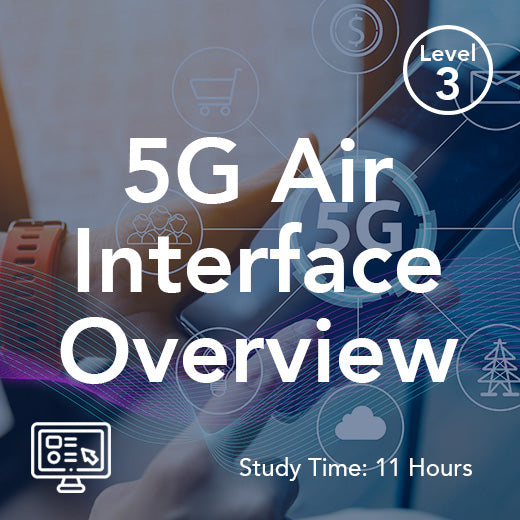
5G Air Interface Overview (On-Demand)
This 5G Air Interface Overview training course provides a technical introduction to the 5G New Radio. Participants will gain insight into the design goals, development schedule, principles, design, and implementation of the 5G air interface. Engineers who are new to or already working in mobile radio communications will benefit from this course, which assumes familiarity with telecommunications and general engineering terminology. Some understanding of LTE cellular systems would also be beneficial for attendees. During this course participants will delve into various topic areas related to 5G, including key features and standardization, use cases, performance objectives, deployment options, radio spectrum, millimeter-wave communications, principles of radio transmission and reception, multiple antennas, air interface protocol stack, architecture of the air interface physical layer, and procedures for data transmission and reception on the 5G air interface. This self-paced on-demand distance learning course features illustrated course books, videos, tests and full tutor support. Who would benefit This course is intended for engineers either new to, or already working in, mobile radio communications. Prerequisites Familiarity with telecommunications and general engineering terminology is assumed. Some understanding of LTE cellular systems would be beneficial. Topic Areas Include: 5G introduction, key features and standardisation Use cases and performance objectives Non-standalone and standalone deployment options Radio spectrum and millimetre wave communications Principles of radio transmission and reception in 5G Multiple antennas in 5G Air interface protocol stack Architecture of the air interface physical layer Procedures for data transmission and reception on the 5G air interface.
£500.00
-
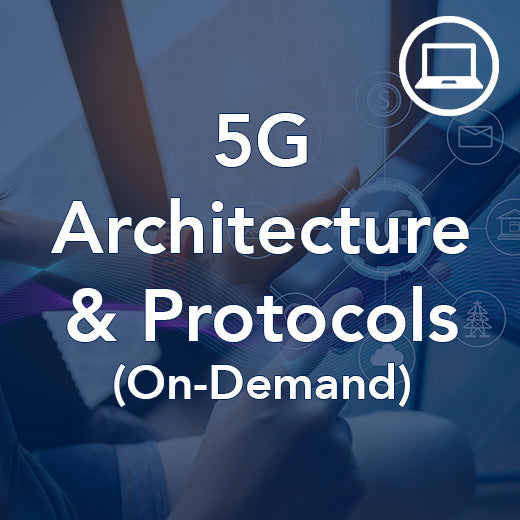
5G Architecture and Protocols (On-Demand)
This 5G Architecture and Protocols on-demand course is a detailed technical description of the core and radio access networks of 5G. It covers the architecture and interfaces used by 5G, the protocols used for signalling and data transport, the provision of services over a 5G network, and the procedures for signalling and system operation. This self-paced on-demand distance learning course features illustrated course books, videos, tests and full tutor support. Who would benefit The course is intended for engineers and other staff who are involved with the architecture, optimization, management, monitoring or testing of the 5G network. Prerequisites An engineering background with some knowledge of core and radio access network technologies is assumed. A basic understanding of 5G and experience of LTE networks would be desirable. Topic Areas Include: 5G introduction, use cases and standardisation Radio access network architecture and deployment options Network architectures for dual connectivity Architecture of the 5G core network Network Function virtualisation, slicing and orchestration Interworking and compatibility between 5G, LTE and Wi-Fi PDU connectivity, Quality of Service and service provision Control plane and user plane protocols in the 5G network Implementation of network function services using HTTP/2 Signalling procedures for registration, security and session management Network operation in Idle, Inactive and Connected modes
£1,815.00
-
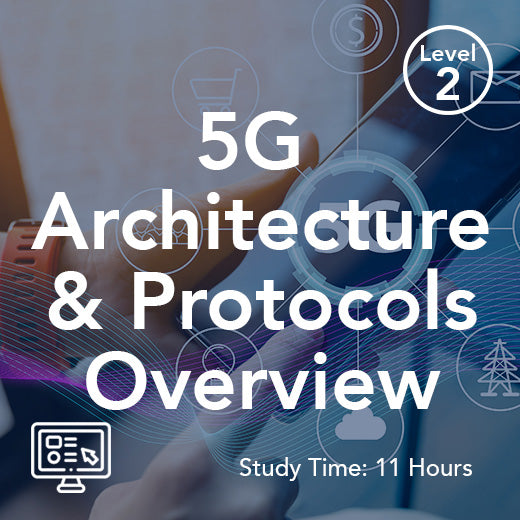
5G Architecture and Protocols Overview (On-Demand)
This 5G Architecture and Protocols Overview on-demand training course provides a comprehensive technical introduction to the 5G network, covering design goals, development schedules, and the core and radio access networks of 5G. Engineers new to or already working in mobile communication networks will benefit from this course, which assumes familiarity with telecommunications and general engineering terminology, with some understanding of LTE cellular systems being beneficial. The course covers a range of topic areas, including 5G introduction, key features, and standardization, use cases and performance objectives, radio access network architecture and protocols, core network architecture and protocols, network function virtualization, network slicing, interworking and compatibility between 5G, LTE, and Wi-Fi, PDU connectivity, Quality of Service, service provision, and signaling procedures in the 5G network. This self-paced on-demand distance learning course features illustrated course books, videos, tests and full tutor support. Who would benefit This course is intended for engineers either new to, or already working in, mobile communication networks. Prerequisites Familiarity with telecommunications and general engineering terminology is assumed. Some understanding of LTE cellular systems would be beneficial. Topic Areas Include: 5G introduction, key features and standardisation Use cases and performance objectives Radio access network architecture and protocols Non standalone and standalone deployment options Core network architecture and protocols Network function virtualisation and network slicing Interworking and compatibility between 5G, LTE and Wi-Fi PDU connectivity, Quality of Service and service provision Signalling procedures in the 5G network
£500.00
-
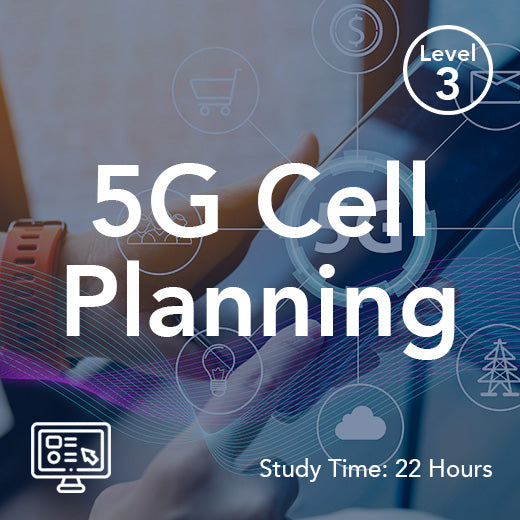
5G Cell Planning (On-Demand)
Our 5G Cell Planning training course is designed to provide network planning engineers with the essential knowledge and skills needed to effectively plan radio access networks for 5G. Through practical worked examples and in-depth discussions, participants will gain a solid understanding of coverage and capacity estimations, RF KPIs, signal measurements, and parameters that impact the random access process. By the end of the course, students will be equipped with the theoretical knowledge and practical tools to confidently plan 5G cells and optimize network performance. Whether you are new to 5G cell planning or looking to enhance your existing skills, this training programme is suitable for anyone with a background in telecommunication systems and radio network planning. Join us and take your 5G cell planning expertise to the next level. Don't miss out on the opportunity to advance your career in 5G cell planning. Enroll in our live online training course today and gain valuable insights into the fundamentals of the 5G air interface, link budget estimation, coverage estimation, capacity estimation, and more. For a self-paced learning option, check out our On-Demand Training Programme and start mastering 5G cell planning at your own pace. This self-paced on-demand distance learning course features illustrated course books, videos, tests and full tutor support. Who Would Benefit This course is intended for network planning engineers, who wish to learn about the issues that are involved when planning radio access networks for 5G. Prerequisites The course assumes familiarity with telecommunication systems and with the principles of radio network planning. Some understanding of radio network planning for LTE, and of the 5G air interface, would be beneficial. Topic Areas Include Fundamentals of the 5G Air Interface Link Budget Estimation Coverage Estimation Fundamentals of the 5G Air Interface Link Budget Estimation Coverage Estimation
£750.00
-
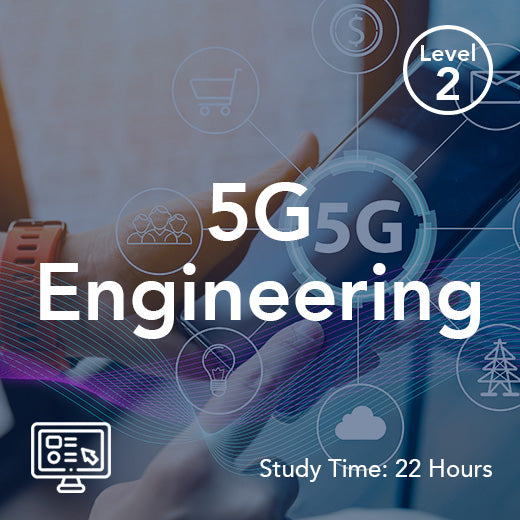
5G Engineering (On-Demand)
This 5G Engineering on-demand training course is designed to provide a comprehensive technical introduction to 5G technology. The course covers the design goals, development schedule, principles, design, and implementation of the 5G air interface, radio access network, and core network. Participants will gain a deep understanding of the operation of the 5G system through illustrated course books, videos, tests, and full tutor support. Engineers who are new to the field of mobile communications or those already working in the industry can benefit greatly from this course. Familiarity with telecommunications and general engineering terminology is assumed, and some understanding of LTE cellular systems would be beneficial for participants looking to get the most out of this training. By enrolling in this course, participants will delve into key topics such as 5G introduction, use cases, air interface principles, radio access network architecture, core network protocols, network function virtualisation, interworking between 5G, LTE, and Wi-Fi, and much more. With a total duration of 22 hours, this on-demand training course offers a flexible and convenient way to enhance your knowledge and skills in the rapidly evolving field of 5G technology. Who would benefit This course is intended for engineers either new to, or already working in, mobile communications. Prerequisites Familiarity with telecommunications and general engineering terminology is assumed. Some understanding of LTE cellular systems would be beneficial. Topic Areas Include 5G introduction, key features and standardisation Use cases and performance objectives Principles of the air interface: radio spectrum, OFDMA and multiple antennas Air interface protocol stack Architecture of the air interface physical layer Procedures for data transmission and reception on the 5G air interface Radio access network architecture and protocols Non-standalone and standalone deployment options Core network architecture and protocols Network function virtualisation and network slicing Interworking and compatibility between 5G, LTE and Wi-Fi PDU connectivity, Quality of Service and service provision Signalling procedures in the 5G network
£1,815.00
-
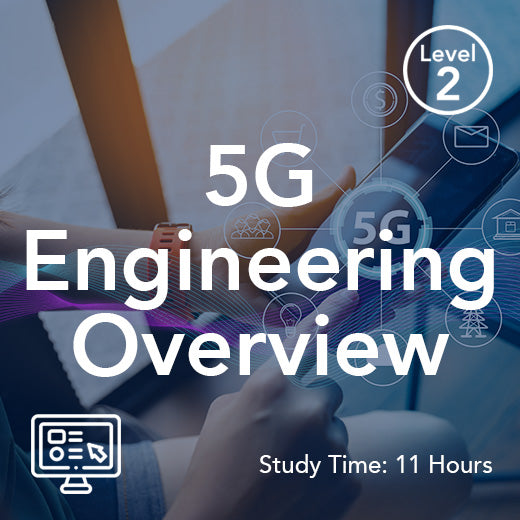
5G Engineering Overview (On-Demand)
This 5G Engineering Overview course is a technical overview of 5G. The course includes the design goals and development schedule for 5G, and the principles and architecture of the 5G air interface, radio access network and core network. This 5G Engineering Overview training course provides a comprehensive technical overview of 5G, including its design goals, development schedule, and the principles and architecture of the 5G air interface, radio access network, and core network. Engineers new to or already working in mobile communications will benefit from this course, gaining valuable insights into the latest advancements in 5G technology. Participants in this course are assumed to have familiarity with general engineering and telecommunications terminology, with some understanding of LTE cellular systems being beneficial. The course covers a range of topic areas, including 5G introduction and key features, standardization and timelines for 3GPP and the ITU, use cases and performance objectives, radio spectrum and millimeter wave communications, principles of radio transmission and reception in 5G, radio access network architecture, non-standalone and standalone deployment options, core network architecture, network function virtualization and network slicing, and interworking and compatibility between 5G, LTE, and Wi-Fi. Overall, this 5G Engineering Overview training course offers a valuable opportunity for engineers to deepen their understanding of 5G technology and its implications for mobile communications. This self-paced on-demand distance learning course features illustrated course books, videos, tests and full tutor support. Who would benefit This course is intended for engineers either new to, or already working in, mobile communications. Prerequisites Familiarity with telecommunications and general engineering terminology is assumed. Some understanding of LTE cellular systems would be beneficial. Topic Areas Include 5G introduction and key features Standardisation and timelines for 3GPP and the ITU Use cases and performance objectives Radio spectrum and millimetre wave communications Principles of radio transmission and reception in 5G Radio access network architecture Non standalone and standalone deployment options Core network architecture Network function virtualisation and network slicing Interworking and compatibility between 5G, LTE and Wi-Fi
£500.00
-

5G NG-RAN Signalling Procedures (On-Demand)
Mobility and state management are at the heart of delivering seamless connectivity in 5G networks. This short, single-module course provides a technical overview of how the 5G Next Generation Radio Access Network (NG-RAN) manages UE mobility and RRC state transitions through signalling interactions. In just three hours, you'll explore how devices move between key RRC states - RRC_IDLE, RRC_INACTIVE, and RRC_CONNECTED - and how signalling flows coordinate these transitions between the UE, gNBs, and core network functions such as the AMF, SMF, and UPF. The course covers a range of mobility procedures, including intra- and inter-gNB handovers, with a focus on signalling, context management, and data forwarding. You'll also learn how dual connectivity is managed, including the addition and release of secondary nodes. Designed for technical professionals who need a solid introduction to how 5G NG-RAN handles mobility and signalling, this course equips you with the essential knowledge required to understand and troubleshoot mobility-related behaviour in live 5G networks. Course Contents Idle Mode RRC Connected Mode RRC Inactive Mode RRC Connected Additional Handovers Secondary Nodes Final Transitions
£95.00
-
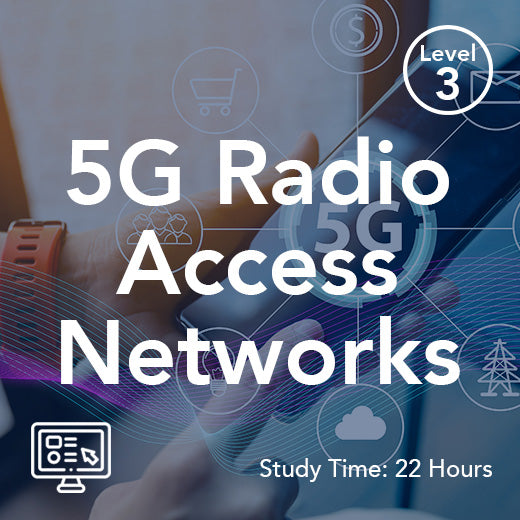
5G Radio Access Network (On-Demand)
Our 5G Radio Access Network training course is designed to provide professionals in the telecommunications industry with the knowledge and skills needed to effectively design, deploy, and manage 5G networks. In this course, participants will learn about the key concepts and technologies behind 5G RAN, including massive MIMO, beamforming, and network slicing. Our expert trainers will guide you through hands-on exercises and real-world case studies to help you gain practical experience in implementing 5G RAN solutions. By enrolling in our 5G RAN training course, you will be equipped with the latest industry insights and best practices to stay ahead in the rapidly evolving telecommunications landscape. Whether you are a network engineer, system architect, or project manager, this course will provide you with the tools and expertise needed to drive successful 5G RAN deployments. Join us at Wray Castle and take your career to the next level with our comprehensive 5G Radio Access Network training course. This self-paced on-demand distance learning course features illustrated course books, videos, tests and full tutor support. Who Would Benefit Engineers that need to know about the 5G Radio Access Network in terms of its characteristics, architecture, interfaces and operation Prerequisites Ideally students will have a mobile telecommunications or radio background gained from the study of or working with GSM, UMTS or LTE networks. Topic Areas Include Introduction to 5G 5G RAN NG Interface Messages and Procedures Xn Interface Messages and Procedures E1 Interface Messages and Procedures F1 Interface Messages and Procedures Multi-RAT Dual Cennectivity
£750.00
-

5G RAN Architecture and Features (On-Demand)
As 5G networks continue to expand and evolve, a solid understanding of the 5G Radio Access Network (RAN) is essential for those involved in mobile network planning, deployment, or operations. This short, single-module course provides a focused overview of the 5G RAN architecture and the key features that distinguish it from previous generations. In just three hours, you'll explore the structure of the 5G RAN, including the role of the gNB (Next Generation Node B) and its functional split into Centralised Units (CUs) and Distributed Units (DUs). The course explains the key interfaces - NG, Xn, F1, and E1 - that enable communication between RAN components, other base stations, and the core network. You'll also gain insight into different deployment scenarios such as Dual Connectivity (DC) and Multi-RAT Dual Connectivity (MR-DC), which allow 5G to coexist and coordinate with legacy networks. Additionally, the course covers the evolution of the fronthaul interface from CPRI to eCPRI, the importance of backhaul capacity, and the need for precise timing and synchronisation in high-performance 5G networks. Designed for technical professionals needing a clear and accessible introduction to 5G RAN architecture, this course delivers the essential concepts required to understand and engage with today’s 5G radio access technologies. Course Contents 5G RAN Overview Dual Connectivity (DC) 5G non-Standalone and Standalone Options RAN Options EN-DC NGEN-DC and NE-DC RAN User Plane Connectivity RAN Control Plane Connectivity gNB Architecture Centralized and Distributed Deployments Common Public Radio Interface (CPRI) and eCPRI Fronthaul and Backhaul Requirements Synchronisation Requirements
£95.00
-
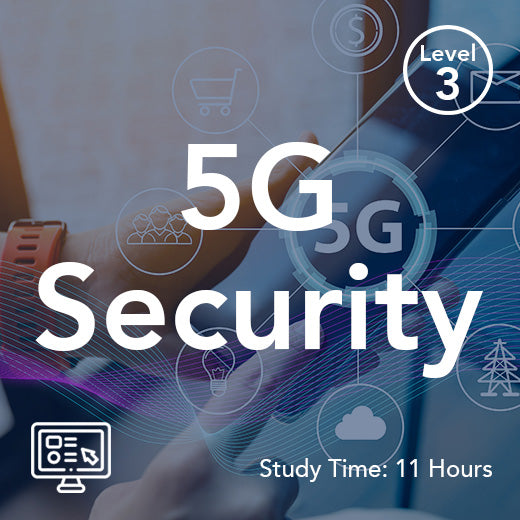
5G Security (On-Demand)
The nature of 5G means that the security architecture and processes need to cover new aspects (when compared to previous 3GPP generations), including 5GNR/LTE Dual Connectivity, standardized interfaces for distributed gNB / RAN architectures, more tightly integrated Non-3GPP Access, and most significantly, the new Service Based Interfaces used within the 5G Core. The 5G Security on-demand course provides a comprehensive grounding in this expanded set of security requirements and mechanisms used in 5G. We start by considering the 5G architecture in order to better understand the overall security requirements for both the UE and network. We then build on the security architecture of 4G LTE, with relevant modifications and additions required for 5G, before focusing squarely on the additional features and procedures required to secure the 5G Core Network (Service Based Interface). This self-paced on-demand distance learning course features illustrated course books, videos, tests and full tutor support. Who would benefit This course is designed for engineers, managers and other personnel who have a need to acquire a technical overview of the security environment employed within 5G networks. It will also be of benefit to those in the wider technical community who have a need to understand the security protocols employed by advanced cellular networks. Prerequisites An understanding of 4G (and legacy 2G and 3G) security procedures would be an advantage as would a basic understanding of 5G and / or LTE network architecture and functionality. Topic Areas Include 5G Architecture and the Service Based Interface 5G Security Architecture and Authentication and Key Agreement Security and the Service Based Interface (including SEPP)
£500.00
-
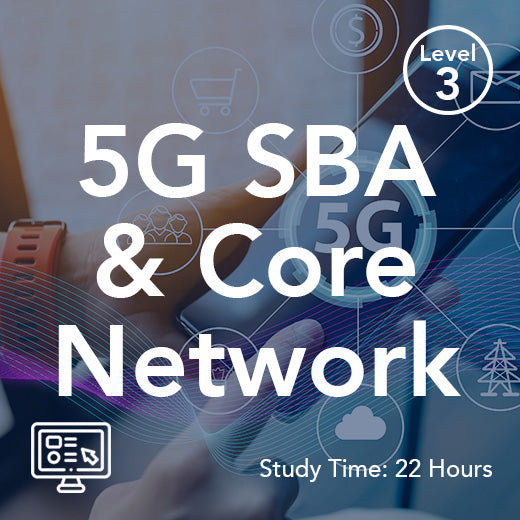
5G Service Based Architecture and Core Network (On-Demand)
Our 5G Service Based Architecture and Core Network Training Course is designed to provide a comprehensive understanding of core network functions within the SBA, as well as the protocols and technologies that support the 5G Core. Through example procedures and in-depth exploration of the Service Based Interface (SBI) and Service APIs, participants will gain valuable insights into key 5G enabling principles such as virtualization and network slicing. Additionally, the course covers security on the SBI, introducing new network functions and techniques that enhance the security features of the core network domain. Ideal for professionals involved in the design, deployment, and development of 5G Service Based Architecture and the 5G Core, this technical course requires some prior knowledge or experience with the 5G system from a technical perspective. Topics covered include 5G introduction and deployment options, core network functions, supporting protocols and technologies, SBI security, and more. Participants will benefit from live online sessions led by industry experts, providing a dynamic and interactive learning experience. For those looking to explore, test, optimize, and troubleshoot the 5G system beyond the theoretical, we also offer an optional 5G Virtual Lab Module. This fully emulated environment allows participants to experiment with configurations for Network Functions and customize settings for signaling scenarios, providing a hands-on approach to developing a deeper understanding of the operation of the 5G system. This self-paced on-demand distance learning course features illustrated course books, videos, tests and full tutor support. Who would benefit This course is designed for those involved in the design, deployment and development of the 5G Service Based Architecture and the 5G Core. Prerequisites This is a technical course, so experience or knowledge of the 5G system from a technical perspective would be an advantage. Topic Areas Include 5G Introduction and Deployment Options The 5G Core Network Functions 5G Core Supporting Protocols and Technologies The Service Based Interface (SBI) and Service APIs Explained Procedures Deployment options SBI Security
£750.00
-

5G Signalling Procedures - Technical Overview (On-Demand)
As 5G networks mature, a solid grasp of the procedures that govern how devices and network functions interact is essential for professionals working in planning, operations, or optimisation. This short course offers a technical overview of the core signalling and operational procedures in 5G Standalone (SA) networks. In just three hours, you'll explore how 5G procedures have evolved - from initial deployments that relied on LTE signalling to fully native 5G implementations across both the core and radio access network. The course covers the step-by-step processes involved in device registration, network function discovery, and session establishment and modification. You'll also gain insight into mobility management procedures, including how 5G handles transitions between different UE states - idle, connected, and inactive - and how it manages tasks like cell selection, registration updates, service requests, and handovers. The role of the Radio Resource Control (RRC) protocol in managing radio connections, reporting measurements, and supporting dual connectivity scenarios is also explained. This course is designed to provide technical professionals with a foundational understanding of how 5G devices and networks interact through signalling and procedure flows, forming the basis for reliable service delivery in real-world deployments. Course Contents 5G Procedures NF Service Registration, Discovery, Subscription and Notification Power-on Procedures Registration Procedure PDU Session Establishment Server-triggered PDU Session Modification and QoS Flow Establishment Change of PDU Session Anchor Mobility Management and Registration Update UE Triggered Service Request Procedure RNA Update and RRC Transitions Xn-based Handover Procedure Addition of a Secondary Node Access Network Release Procedure Signalling Procedures RRC Signalling Overview NSA and SA RRC Reconfiguration Message Overview RRC Measurements Procedures MR-DC Procedures
£95.00
-

5G Standalone - Core Network Architecture (On-Demand)
As mobile networks transition to full 5G Standalone deployments, understanding the 5G Core (5GC) is essential for engineers and technical professionals involved in network design, deployment, or support. This single-module course offers a concise but comprehensive introduction to the 5G Core Network Architecture. In just three hours, you’ll explore the key building blocks of the 5G Core, including the main network functions such as the UDM, AMF, SMF, and UPF, and their roles in managing subscriber data, mobility, sessions, and user traffic. The module also explains important network and UE identifiers, tracking area concepts, and the role of service-based interfaces in enabling 5G’s flexibility. You’ll gain insight into how 5G supports roaming, interworks with legacy EPC networks, and introduces network slicing—a powerful concept that allows the same physical network to support a wide variety of use cases with different performance requirements. This course is ideal for those who need a technical overview of the 5G Core without going deep into protocol-level detail, and serves as a foundation for further learning or practical application in 5G projects. Course Contents 5G Core Network Functions Overview Reference Point Architecture 5G Roaming Architectures Service Based Architecture Service Based Interface Concepts 5G Core Network Functions Data Storage Architecture Interworking and Migration Non-3GPP Access 5G Identities Identities for Network Slicing TAC and RAN Identites
£95.00
-

5G Standalone - Network Protocols (On-Demand)
Understanding the protocols that underpin 5G Standalone (SA) deployments is critical for anyone involved in mobile network design, deployment, or troubleshooting. This single-module course provides a practical overview of the key signalling and user plane protocols that enable communication within the 5G system. In just three hours, you'll explore how 5G SA uses modern service-based interfaces, with a focus on HTTP/2 and JSON for communication between core network functions. You'll also learn about protocol roles such as PFCP for user plane control, GTPv2-C for EPC interworking, and NAS protocols for direct signalling with the user equipment. The course also covers the essential signalling protocols in the NG-RAN, including NG-AP, Xn-AP, F1-AP, E1-AP, and RRC - critical for coordinating activity across the RAN and between the RAN and core. On the user plane, you’ll examine how data transport is managed using PDU sessions, and how session types (IP, Ethernet, Unstructured) are established and handled. You’ll also gain an understanding of QoS Flows, with parameters such as 5QI and ARP used to deliver differentiated service levels. This course is ideal for technical professionals who need a working knowledge of 5G SA protocol architecture, signalling behaviour, and data transport mechanisms - without going deep into packet-level analysis. Course Contents PDU Sessions and QoS Flows 5G QoS Parameters, ARP and 5QI Implementation of PDU Sessions IP PDU Session Types, IP Ethernet and Unstructured Multiple PDU Sessions Anchors Reflective QoS User Plane Protocol Stack Core Network Signalling Overview Hypertext Transfer Protocol (HTTP) HTTP 2 and JSON_2 Non-Access Stratum (NAS) and Access Stratum (AS) Protocols Next Generation Radio Access Network (NG-RAN) Signalling Protocols Overview RAN Protocols for the NG, FI, E1 and Xn Interfaces RAN User Plane Protocol
£95.00
-

5G Technologies, Services and Markets (On-Demand)
This 5G Technologies, Services and Markets on-demand course is a non-technical introduction to the 5G mobile communication system, including its capabilities, general structure and operation, as well as its position as a development of previous technologies. The course also covers the place that 5G holds in the telecommunications market, and how that is developing. This 1-day training course is designed to provide a comprehensive overview of 5G technologies, services, and markets. The course covers the basics of 5G mobile communication systems, including their capabilities, structure, and operation, as well as their evolution from previous technologies. Participants will also gain insights into the current landscape of the telecommunications market and the role that 5G plays in shaping its future. Ideal for non-technical professionals in the mobile or fixed telecommunications sector, this course requires no prior technical knowledge but some familiarity with the industry would be beneficial. Topics covered include an introduction to 5G, market drivers, use cases, performance objectives, key features, network architectures, voice services, industry players, standardization, and the relationship between 5G, LTE, and Wi-Fi. By enrolling in this course, participants will gain a solid understanding of 5G technologies and their impact on the telecommunications industry. Stay ahead of the curve and enhance your knowledge with this engaging and informative training opportunity. This self-paced on-demand distance learning course features illustrated course books, videos, tests and full tutor support. Who would benefit This course is intended for non-technical professionals either new to, or already working in, the mobile or fixed telecommunications sector. Prerequisites No technical knowledge is assumed but some familiarity with the telecommunications industry would be beneficial. Topic Areas Include Introduction to 5G Market drivers for 5G Use cases for 5G Performance objectives and spectrum requirements Concepts and key features of 5G Architecture of the core and radio access networks of 5G Voice services in 5G Key industry and market players Standardisation and timelines for 3GPP and the ITU 5G, LTE and Wi-Fi – a holistic approach
£95.00
-

5G – Standalone, Enablers for the Industry & Business Perspective (On-Demand)
With SA 5G, we witness the evolution of mobile networks, from being reliant on legacy infrastructure, to achieving true independence - and unlocking unprecedented capabilities that enables 5G to support a much wider range of industrial use cases. In this course, we guide you through the benefits and challenges of deploying Standalone 5G, exploring its architectural advancements, unique features, and the benefits it brings to both consumers and businesses. We then highlight the enhanced capabilities and expanded use cases made possible by key technology enablers - including network slicing, edge computing, virtualization, non-terrestrial networks (NTNs), network exposure, and network automation. We discuss the impact of 5G SA for network operators, service providers, and enterprises - exploring the opportunities and challenges that arise in the deployment and management of advanced 5G networks. Who Would Benefit Ideal for anyone needing clarity on 5G trajectory – including capabilities & use cases Prerequisites A basic appreciation of the telecoms landscape – both technical and business Course Contents 5G Base Capabilities A Business Perspective 5G Standalone (SA) 5G Enablers for Industry
£95.00
-

5G/6G Essential Protocols and Procedures (Training & IEEE Innovation Testbed)
Transformative Training Powered by IEEE and Wray Castle Powered by the joint expertise of IEEE and Wray Castle, the 5G/6G Essential Protocols & Procedures Training and Innovation Testbed offers a comprehensive exploration of 5G’s most crucial protocols and procedures. This cutting-edge course blends robust theory with hands-on practice via the IEEE 5G/6G Innovation Testbed - a secure, cloud-based platform providing end-to-end 5G network testing capabilities. The Key Protocols & Procedures Putting Theory Immediately into Practice 5G Registration Process - Identities, Authentication, Subscriber Data Network Functions & Interactions - UDM, UDR, PCF, AMF, SMF, UPF PDU Session Establishment - End-to-End signaling and network slicing PFCP & N4 Signaling -Policy and Session Management in 5G Specifically designed for: System engineers and integrators Engineers working with operation, optimization, and troubleshooting Technical professionals responsible for 5G System signaling
£1,045.00
-
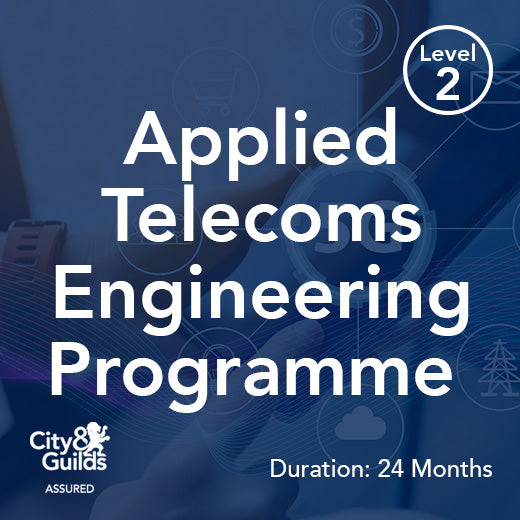
Applied Telecoms Engineering Programme (5G Engineer Track)
The Applied Telecoms Engineering Programme (5G Engineer Track)distance learning programmes provides learners with a certified qualification that demonstrates their knowledge of the technologies underpinning the telecoms industry with a focus on 5G network architecture and protocols and the 5G Air Interface. This programme has been assured by City & Guilds. Assured status provides validation and recognition for the learner. It is a symbol of learning excellence and quality and is a reassurance that the training undertaken meets best practice standards. Applied Telecoms Engineering Programme (5G Engineer Track) Syllabus Foundation Courses Technology Fundamentals Course Modules: Defining Telecoms Background to the Telecom Network Digital Fixed Telecom Networks Data Networks Mobile Networks and Wi-Fi Broadband and Emerging Networks 2G to 5G Mobile Technologies Course Modules: Principles of Mobile Cellular Networks 2nd Generation Mobile Networks 3rd Generation Mobile Networks 4th Generation Mobile Networks 5th Generation Mobile Networks Telecoms – as an Industry and Business Course Modules: Telecoms Industry & Business Dynamics The Technology Explained & Evaluated Telecoms Industry & Market Update Specialist Courses 5G Architecture and Protocols Course Modules: Introduction to 5G Radio Access Network Architecture Core Network Architecture Data Transport 5G Protocols 5G Procedures Releases 16 and 17 5G Air Interface Course Modules: Principles of the 5G New Radio Introduction to the Physical Layer Physical Layer Implementation and Procedures Higher Layer ProtocolsSignalling Procedures What you will learn: At the end of the programme successful students will be able to: Develop a fundamental understanding of the technologies underpinning modern telecoms networks, the industry structure and its key stakeholders . Understand the architecture and interfaces used by 5G, the protocols used for signalling and data transport, the provision of services over a 5G network, and the procedures for signalling and system operation. Master the principles of mmWave and multiple antenna communications, the architecture and implementation of the AI's physical layer, the higher layer AI protocols. What sets the programme apart? Focused Learning Pathways – guide you through the material and enable you to become an expert in your chosen field. Flexible Learning – study at a time, location and pace of your choice. Full Tutor support – from industry experts with decades of experience throughout your studies. Extended Learning – Diploma students have the opportunity to study 3 additional courses. 24 months access – allowing you to refer back to the material after your studies. Digital Badges and Course Certificate – demonstrate the depth of your knowledge. About City & Guilds City & Guilds is a household brand and a global leader in skills development. Over one million people earn a City & Guilds qualification every year, providing them with the skills they need to thrive in the workplace.In the global economy, the ability to compete depends on building a skilled, competent and confident workforce. City & Guilds understands the value of portable skills and globally recognised standards that enable people and organisations to succeed. It partners with Governments, employers and educators in over 50 countries, across five continents, to advise them on developing high-quality skills training that meets the needs of the global workforce, without compromising on local demands. Enrolment Fees: £2,995 (+VAT) Programme Duration: 24 months (Programme is On-Demand, learners can start at any time) Bespoke In-Company Schemes The Applied Telecoms Engineering Programme provide the ideal structure for formalising training programmes for teams across your business. Contact us on info@wraycastle.com for more information.
£2,995.00
-
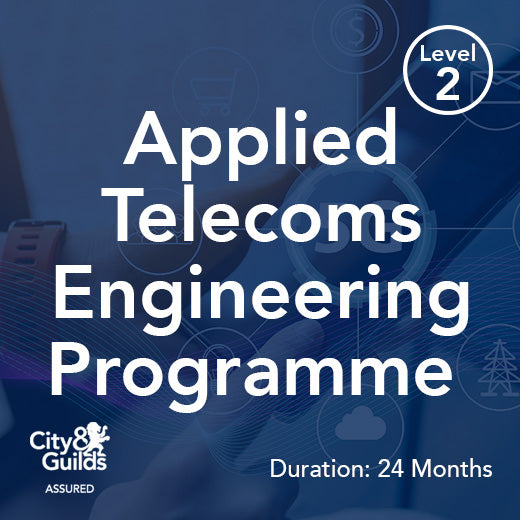
Applied Telecoms Engineering Programme (Cellular Radio Engineer)
The Applied Telecoms Engineering Programme (Cellular Radio Engineer Track) distance learning programme provides learners with a qualification that demonstrates their knowledge of the technologies underpinning the telecoms industry with a focus on cellular radio engineering. Students will gain a through foundation in the telecoms industry and the technologies on which it’s based as well as a comprehensive understanding of the technologies underpinning radio access networks and techniques needed to design, plan, build, monitor and optimise modern cellular radio networks. This programme has been assured by City & Guilds. Assured status provides validation and recognition for the learner. It is a symbol of learning excellence and quality and is a reassurance that the training undertaken meets best practice standards. Applied Telecoms Engineering Programme (Cellular Radio Engineer Track) Syllabus Foundation Courses Technology Fundamentals Course Modules: Defining Telecoms Background to the Telecom Network Digital Fixed Telecom Networks Data Networks Mobile Networks and Wi-Fi Broadband and Emerging Networks 2G to 5G Mobile Technologies Course Modules: Principles of Mobile Cellular Networks 2nd Generation Mobile Networks 3rd Generation Mobile Networks 4th Generation Mobile Networks 5th Generation Mobile Networks Telecoms – as an Industry and Business Course Modules: Telecoms Industry & Business Dynamics The Technology Explained & Evaluated Telecoms Industry & Market Update Specialist Courses LTE Air Interface Course Modules: LTE Overview OFDM Principles Physical Layer Structure Layer 2 Protocols Radio Resource Control LTE-Advanced Lower Layer Procedures 5G Air Interface Course Modules: Principles of the 5G New Radio Introduction to the Physical Layer Physical Layer Implementation and Procedures Higher Layer Protocols Signalling Procedures What you will learn: At the end of the programme successful students will be able to: Develop a fundamental understanding of the technologies underpinning modern telecoms networks, the industry structure and its key stakeholders . Gain a detailed understanding of the air interface for LTE radio access (incl. OFDMA principles, channel structures, connectivity and mobility management and radio link control functions.) Have a detailed technical understanding of the air interface for the 5G New Radio, the principles of mm wave and multiple antenna communications, the architecture of the AI’s physical layer, the higher layer air interface protocols, and the signalling procedures. Expand their learning further by studying two elective modules to qualify for the Diploma in Telecoms. What sets the programme apart? Focused Learning Pathways – guide you through the material and enable you to become an expert in your chosen field. Flexible Learning – study at a time, location and pace of your choice. Full Tutor support – from industry experts with decades of experience throughout your studies. Extended Learning – Diploma students have the opportunity to study 3 additional courses. 24 months access – allowing you to refer back to the material after your studies. Digital Badges and Course Certificate – demonstrate the depth of your knowledge. About City & Guilds City & Guilds is a household brand and a global leader in skills development. Over one million people earn a City & Guilds qualification every year, providing them with the skills they need to thrive in the workplace.In the global economy, the ability to compete depends on building a skilled, competent and confident workforce. City & Guilds understands the value of portable skills and globally recognised standards that enable people and organisations to succeed. It partners with Governments, employers and educators in over 50 countries, across five continents, to advise them on developing high-quality skills training that meets the needs of the global workforce, without compromising on local demands. Enrolment Fees: £2,995 (+VAT) Programme Duration: 24 months (Programme is On-Demand, learners can start at any time) Bespoke In-Company Schemes The Applied Telecoms Engineering Programme provide the ideal structure for formalising training programmes for teams across your business. Contact us on info@wraycastle.com for more information.
£2,995.00
-
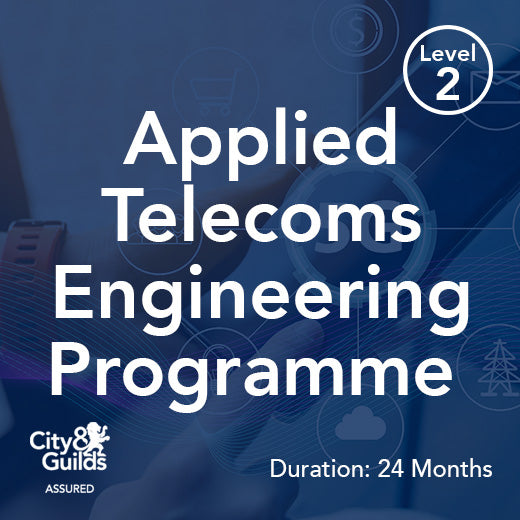
Applied Telecoms Engineering Programme (Core Network Engineer)
The Applied Telecoms Engineering Programme (Core Network Engineer Track) distance learning programmes provides learners with a certified qualification that demonstrates their knowledge of the technologies underpinning the telecoms industry with a focus on core network engineering. Students will gain a through foundation in the telecoms industry and the technologies on which it’s based as well as a deep understanding of the core network procedures, processes and service provision concepts for 4G and 5G Networks. This programme has been assured by City & Guilds. Assured status provides validation and recognition for the learner. It is a symbol of learning excellence and quality and is a reassurance that the training undertaken meets best practice standards. Applied Telecoms Engineering Programme (Core Network Engineer Track) Syllabus Foundation Courses Technology Fundamentals Course Modules: Defining Telecoms Background to the Telecom Network Digital Fixed Telecom Networks Data Networks Mobile Networks and Wi-Fi Broadband and Emerging Networks 2G to 5G Mobile Technologies Course Modules: Principles of Mobile Cellular Networks 2nd Generation Mobile Networks 3rd Generation Mobile Networks 4th Generation Mobile Networks 5th Generation Mobile Networks Telecoms – as an Industry and Business Course Modules: Telecoms Industry & Business Dynamics The Technology Explained & Evaluated Telecoms Industry & Market Update Specialist Courses LTE Evolved Packet Core Course Modules: LTE Overview Evolved Packet Core Data Transport in the EPC Major Protocols EPC Operation Release 9 and Beyond 5G Architecture and Protocols Course Modules: Introduction to 5G Radio Access Network Architecture Core Network Architecture Data Transport 5G Protocols 5G Procedures Releases 16 and 17 What you will learn: At the end of the programme successful students will be able to: Develop a fundamental understanding of the technologies underpinning modern telecoms networks, the industry structure and its key stakeholders . Describe the Evolved Packet Core for LTE systems, architecture, interfaces, service provision concepts, application of IP technologies and the overall protocol architectures. Understand the architecture and interfaces used by 5G, the protocols used for signalling and data transport, the provision of services over a 5G network, and the procedures for signalling and system operation. Expand their learning further by studying two elective modules to qualify for the Diploma in Telecoms. What sets the programme apart? Focused Learning Pathways – guide you through the material and enable you to become an expert in your chosen field. Flexible Learning – study at a time, location and pace of your choice. Full Tutor support – from industry experts with decades of experience throughout your studies. Extended Learning – Diploma students have the opportunity to study 3 additional courses. 24 months access – allowing you to refer back to the material after your studies. Digital Badges and Course Certificate – demonstrate the depth of your knowledge. About City & Guilds City & Guilds is a household brand and a global leader in skills development. Over one million people earn a City & Guilds qualification every year, providing them with the skills they need to thrive in the workplace.In the global economy, the ability to compete depends on building a skilled, competent and confident workforce. City & Guilds understands the value of portable skills and globally recognised standards that enable people and organisations to succeed. It partners with Governments, employers and educators in over 50 countries, across five continents, to advise them on developing high-quality skills training that meets the needs of the global workforce, without compromising on local demands. Enrolment Fees: £2,995 (+VAT) Programme Duration: 24 months (Programme is On-Demand, learners can start at any time) Bespoke In-Company Schemes The Applied Telecoms Engineering Programme provide the ideal structure for formalising training programmes for teams across your business. Contact us on info@wraycastle.com for more information.
£2,995.00
-
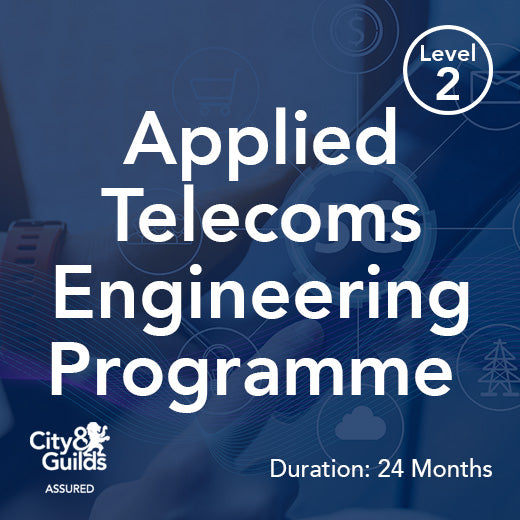
Applied Telecoms Engineering Programme (LTE Engineer Track)
The Applied Telecoms Engineering Programme (LTE Engineer Track) distance learning programmes provides learners with a certified qualification that demonstrates their knowledge of the technologies underpinning the telecoms industry with a focus on LTE core and radio network engineering. This programme has been assured by City & Guilds. Assured status provides validation and recognition for the learner. It is a symbol of learning excellence and quality and is a reassurance that the training undertaken meets best practice standards. Applied Telecoms Engineering Programme (LTE Engineer Track) Syllabus Foundation Courses Technology Fundamentals Course Modules: Defining Telecoms Background to the Telecom Network Digital Fixed Telecom Networks Data Networks Mobile Networks and Wi-Fi Broadband and Emerging Networks 2G to 5G Mobile Technologies Course Modules: Principles of Mobile Cellular Networks 2nd Generation Mobile Networks 3rd Generation Mobile Networks 4th Generation Mobile Networks 5th Generation Mobile Networks Telecoms – as an Industry and Business Course Modules: Telecoms Industry & Business Dynamics The Technology Explained & Evaluated Telecoms Industry & Market Update Specialist Courses LTE Evolved Packet Core Course Modules: LTE Overview Evolved Packet Core Data Transport in the EPC Major Protocols EPC Operation Release 9 and Beyond LTE Air Interface Course Modules: LTE Overview OFDM Principles Physical Layer Structure Layer 2 Protocols Radio Resource Control LTE-Advanced Lower Layer Procedures What you will learn: At the end of the programme successful students will be able to: Develop a fundamental understanding of the technologies underpinning modern telecoms networks, the industry structure and its key stakeholders . Describe the Evolved Packet Core for LTE systems, architecture, interfaces, service provision concepts, application of IP technologies and the overall protocol architectures. Gain a detailed understanding of the air interface for LTE radio access (incl. OFDMA principles, channel structures, connectivity and mobility management and radio link control functions.) Expand their learning further by studying two elective modules to qualify for the Diploma in Telecoms. What sets the programme apart? Focused Learning Pathways – guide you through the material and enable you to become an expert in your chosen field. Flexible Learning – study at a time, location and pace of your choice. Full Tutor support – from industry experts with decades of experience throughout your studies. Extended Learning – Diploma students have the opportunity to study 3 additional courses. 24 months access – allowing you to refer back to the material after your studies. Digital Badges and Course Certificate – demonstrate the depth of your knowledge. About City & Guilds City & Guilds is a household brand and a global leader in skills development. Over one million people earn a City & Guilds qualification every year, providing them with the skills they need to thrive in the workplace.In the global economy, the ability to compete depends on building a skilled, competent and confident workforce. City & Guilds understands the value of portable skills and globally recognised standards that enable people and organisations to succeed. It partners with Governments, employers and educators in over 50 countries, across five continents, to advise them on developing high-quality skills training that meets the needs of the global workforce, without compromising on local demands. Enrolment Fees: £2,995 (+VAT) Programme Duration: 24 months (Programme is On-Demand, learners can start at any time) Bespoke In-Company Schemes The Applied Telecoms Engineering Programme provide the ideal structure for formalising training programmes for teams across your business. Contact us on info@wraycastle.com for more information.
£2,995.00
-

Artificial Intelligence (AI) Fundamentals for Telecoms (On-Demand)
The Artificial Intelligence Fundamentals course is designed to provide participants with a comprehensive introduction to the field of artificial intelligence (AI). Through a combination of theoretical concepts and practical applications, participants will gain a solid foundation in AI and its various subfields, including machine learning, natural language processing, computer vision, and robotics. We explore the use of AI in industry, and in particular in Telecoms and related sectors. By the end of the course, participants will have a strong grasp of AI concepts, techniques, and their real-world applications – particularly in telecoms. They will be equipped to pursue further studies in AI or apply their knowledge to diverse domains where AI plays a significant role. Prerequisites There are no specific prerequisites for this course. However, a basic understanding of programming concepts would be beneficial. Course Contents Introduction to Artificial Intelligence Machine Learning Natural Language Processing (NLP) Computer Vision Robotics and Autonomous Systems AI in Industry Ethics and Responsible AI
£95.00
-

Basics of Carbon Capture and Storage (On-Demand)
The Basics of Carbon Capture and Storage course covers: the role of CCS within decarbonisation as an aspect of earth system science; why CCS is necessary; how CO2 is captured in industrial processes and how it can be used industrially; the factors affecting geological storage; how CO2 stores are monitored for leakage; how CCS will be regulated; how CCS will pay for itself; and the social licence for CCS. The course will be delivered in simple non-technical language suitable for non-specialists. The course satisfies a part of the market that is not currently catered for – the wider science, risks, financing, planning and social licence aspects of CCS. These are issues that are as important as the technical issues (in, for example, reservoir engineering) in the sense that any of these elements can be a show-stopper for CCS. Although the course will cover the technical geological and engineering aspects of CCS, it will also consider how these technical, policy and science aspects affect planning, regulation and financing of CCS. There are geologists, planners, investors and policy makers in companies, government natural resource and planning departments, investment banks and among NGOs that require this information from an unbiassed technically well informed and up to date source. This course provides that source.Who would benefit? The course is designed for geologists, geological planners and regulators, investors and policy makers in energy companies, government natural resource and planning departments, investment banks and NGOs that require information from an unbiassed, technically well informed and up to date source. What people need in advance No particular prior knowledge needed beyond normal levels of expertise in applied geoscience. As stated above, the course is aimed at geological generalists in energy companies, government natural resource and planning departments, investment banks and NGOs. Course Modules: Introduction The geological carbon cycle and anthropogenic influences on the geological carbon cycle Capturing, transporting and using carbon dioxide Geological Storage Regulation, finance, policy and public perception Present state of global CCS Course Director: Prof Mike Stephensen Mike has 25 years’ experience in energy and geological science, including 8 years national level science leadership in the UK. Mike has been providing geoscience advice to Government for almost 15 years and has an excellent overview of Government policy, industrial activity and funding landscape in applied and energy geoscience. Mike also has expertise in positioning organisations in controversial energy topics e.g. CCUS, shale gas and nuclear. Mike was adviser to UK Government Chief Scientist on shale gas and CCUS in 2016; a member UKRI’s Energy Strategic Advisory Committee 2020 to 2021; and a Member of the UK Government’s Hydrogen Advisory Council 2021. Widely recognised as an excellent scientist, he has over 100 peer-reviewed scientific papers including many on CCUS, and ~200 conference abstracts. He is Visiting Professor at the University of Nanjing, China, and the University of Milan, Italy, and has been Honorary Professor at Nottingham and Leicester universities, UK Mike is a well-known communicator of science and has published three single-author popular science books. His book on CCUS ‘Returning Carbon to Nature’ is widely seen as the go-to introductory text on CCUS. Follow Mike on LinkedIn.
£980.00
-

Business Finance – For Non-Financial Managers (On-Demand)
All successful employees, managers and leaders who want to maximise their contribution within the business or organisation need a solid grasp of finances. Whether they are talking strategy, budgets, or customer propositions, it is inevitably the finances that drive the decisions and determine how performance is measured. Being financially literate gives the individual a fundamental business tool, as well as the credibility, to help drive success and to maximise value creation. KPIs can be properly evaluated, major decisions can be grounded in financial reality, and both forecasting and reporting can be used more reliably to help guide efforts and provide the required focus for departments and teams. A key aspect often overlooked, is that greater confidence in both the financial position, and the control mechanisms that are available to employees and managers, will enhance a leader’s risk-awareness. In turn (depending on a range of other factors), this can be a key enabler for business culture that embraces greater levels of creativity and value creation. This programme provides a comprehensive foundation in business finance – covering all the major areas needed to be a fully-functioning member of the mid-senior management team. It is ideal for current or aspiring managers, specialists with financial responsibility, or identified talent / graduates. Although financial principles do not change, they can be applied in very specific ways, depending on the industry / organisation. Examples, case studies and exercises are tailored accordingly Topic Areas Include: The Financial Cycle and Reporting Key Accounting Concepts The Company Operating (Finance) Cycle Three Principal Accounting Documents KPIs, Ratios and Financial Analysis Understanding Finance Key Financial Ratios – Categories and Examples Profitability Efficiency Equity, Loans, and Gearing / Leverage Valuation - Controlling Investment Financial Control, Budgets and Evaluating Initiatives / Projects The Importance of Budgeting and Forecasting Budgets – Getting Specific Mitigating Bad Budget Culture (Teams Aiming for 100% Budget Spend) Understanding Return on Investment (ROI) Cumulative Cash Flows Calculating ROI and using Net Present Value (NPV) Assessing Projects and Using NP
£95.00
-

Cellular Backhaul Technologies (On-Demand)
Backhaul is the backbone of mobile networks, connecting cell sites to the core and ensuring seamless service delivery. As networks evolve to support 4G, 5G, and beyond, understanding backhaul technologies and planning principles is critical for telecom professionals. In this course, you’ll start with an overview of backhaul planning, including traditional and evolved requirements, architecture for multi-RAT environments, and techniques for dimensioning transport networks. You’ll learn how backhaul supports access networks and why its design impacts performance and scalability. Next, you’ll explore transport network architecture, covering 3GPP definitions, layered design, and evolution toward multi-operator and multi-RAT solutions. The course examines backhaul transmission options, comparing Layer 1 technologies, Ethernet physical layers, and microwave radio systems, along with their capacities and limitations. You’ll also dive into synchronization for mobile backhaul, including frequency, phase, and time requirements. Topics include Precision Time Protocol (PTP), Synchronous Ethernet, telecom profiles, and synchronization architectures for packet-based networks. Finally, you’ll review industry initiatives and standards, such as NGMN and MEF, and learn how IP/MPLS, VLAN management, and QoS mapping enable secure, resilient backhaul. The course addresses security, load balancing, and operational best practices for modern mobile networks. Designed for professionals in telecoms and network engineering, this course provides a clear, practical introduction to cellular backhaul technologies - ideal for anyone seeking to understand how transport networks evolve to meet the demands of next-generation mobile services. Course Contents Backhaul Planning Overview Transport Network Backhaul Technologies Synchronisation of Mobile Backhaul Backhaul Initiatives
£95.00
-

Cellular Communication - Idle and Connected Mode Activities (On-Demand)
Mobile devices constantly switch between idle and connected states to balanceperformance and power efficiency. Understanding these activities is essential for anyoneworking in mobile networks, radio planning, or device optimization. In this course, you’ll start with idle mode activities, exploring how devices select andreselect cells across technologies like GSM, UMTS, LTE, 5G, and Wi-Fi. You’ll learn aboutpower-on procedures, cell selection criteria, location updating, and how routing and trackingareas are managed. The course explains key parameters such as C1 and C2, andintroduces advanced concepts like URA updates and PLMN selection. Next, you’ll dive into connected mode activities, covering measurement procedures andhandover strategies for GSM, UMTS, LTE, and 5G. You’ll explore how devices report signalquality, trigger events for handover, and maintain connectivity during mobility. Topicsinclude soft handover, outer loop power control, and advanced measurement events (A1–A6, B1–B2) used in 5G networks. You’ll also learn about automatic neighbour relations andhow they simplify network management. Designed for professionals in telecoms and wireless engineering, this course provides aclear, practical introduction to idle and connected mode operations - ideal for anyoneseeking to understand how mobile devices interact with cellular networks in real-worldscenarios. Course Contents Idle Mode Activity for Mobile Devices GSM Cell Selection GSM Cell Reselection Location Updating UMTS Cell Selection and Reselection UMTS Update Procedures LTE Power On Procedure LTE Cell Reselection 5G Cell Selection Procedure 5G Cell Reselection Wi-Fi Mobility Connected Mode Activity for Mobile Devices GSM Handovers UMTS Handovers LTE Handovers 5G Handovers
£95.00
-

Cellular Radio Measurements (On-Demand)
Cellular networks rely on precise measurements to deliver reliable coverage and highqualityservice. Understanding these principles is essential for anyone working in mobilecommunications, network planning, or performance optimization. In this course, you’ll start with the foundations of cellular radio, exploring traditionalcoverage methods, the cellular philosophy, and concepts like reuse distance, cellhierarchies, and antenna configurations. You’ll learn how propagation, multipath effects,and fading - such as Rayleigh and Rician fading, impact signal quality, and how diversitytechniques improve performance. Next, you’ll dive into radio measurements, covering key concepts such as logarithms,decibels, and power levels in dBm and dBW. The course explains how to perform systemcalculations and interpret measurements across technologies including GSM, UMTS, LTE,and Wi-Fi. You’ll explore metrics like RSRP, RSRQ, SINR, and timing advance, and seehow best-server plots are used for network optimization. Designed for professionals in telecoms and wireless engineering, this course provides aclear, practical introduction to cellular radio measurements - ideal for anyone seeking tounderstand how signal strength and quality are assessed in modern mobile networks. Course Contents Cellular Radio Principles Cellular Philosophy Base Stations Cellular Coverage Cells in Built up Areas Propagation Issues Radio Measurements Decibels GSM Measurements UMTS Measurements LTE Measurements SINR Measurements 5G Measurements Wi-Fi Measurements
£95.00
-

Cloud Architecture and Technologies (On-Demand)
Cloud computing underpins much of today’s digital infrastructure - but what exactly makes the cloud work? This short, single-module course demystifies the architecture and technologies behind cloud services, giving you a structured overview of how cloud systems are designed, deployed, and secured. In just three hours, you’ll explore the core cloud types - public, private, hybrid - and learn the key terminology that underpins modern cloud discussions. You’ll then look at the enabling technologies that support cloud computing, from virtualisation and containerisation to software-defined infrastructure and automation. The course goes on to explain how cloud services are architected, including layered service models, the roles of cloud orchestration and APIs, and how infrastructure is provisioned dynamically. You’ll also examine how cloud environments are managed and secured, with a focus on governance, monitoring, data protection, and access control. Ideal for technical professionals and learners seeking a deeper understanding of how cloud platforms work, this course equips you with the vocabulary, concepts, and architectural knowledge needed to confidently engage in cloud-related conversations and planning. Course Contents Cloud – Types and Terminology Cloud Technology Cloud Architecture and Services Cloud Management and Security
£95.00
-

Cloud Computing (On-Demand)
Our Cloud Computing Training Course provides a technical introduction to the fundamental techniques and protocols that support cloud computing services. Participants will gain insight into the various types of clouds that can be created and the wide range of 'X as a service' offerings available through cloud platforms. This course is ideal for engineering professionals, technical managers, and sales/marketing staff seeking a comprehensive technical overview of Cloud Computing. Participants should have a basic understanding of internet architecture and technologies to fully benefit from this course. Our expert instructors will cover essential topics such as 'What is ‘The Cloud’?', Cloud Architecture and Technologies, Advanced Cloud Architecture Technologies, Types of Cloud Service, Pros and Cons of Cloud Computing, and Telecoms Services and the Cloud. By the end of the course, participants will have a solid understanding of cloud computing principles and how they can be applied in a variety of industries. Who would benefit This course is suitable for engineering, technical management and sales/marketing staff who require a technical overview of Cloud Computing. Prerequisites A basic understanding of the architecture and technologies that support the internet would be beneficial. Topic Areas Include What is ‘The Cloud’? Traditional Models vs Cloud Computing Cloud characteristics Cloud deployments models – private, community, public, hybrid Enabling technologies Traditional data centres Virtualization and multi-tenanting SOA and web services Service grids and autonomic computing Types of Cloud services SaaS, PaaS and IaaS XaaS payment models Pros and Cons of Cloud Computing Pros: cost, scalability, resilience, collaboration Cons: security, availability, trust, de-skilling The future of Cloud Computing On-Demand Online Training Accessible on any device on-demand online training allows you to study at a time and location convenient to you. Each course includes: Illustrated Course Books - featuring leading-edge knowledge from subject matter experts. Videos - Detailed videos expand the points covered in the course books. Tutor Support – Connect with leading experts, ask questions to deepen your understanding. Formative Assessment - Modules include regular quizzes to support learning. Certification – Complete the end-of-module tests to earn Digital Badges to demonstrate the depth of your knowledge of the topic. Included in Wray Castle Hub This course is also available as part of the Wray Castle Hub. An annual subscription delivers unlimited access to this course and over 500 hours of learning material consisting of 30+ Courses, 190+ Learning Modules, and 1,000+ Videos. Annual Subscription: £1400 (Most cost-effective option) Subscribe to Wray Castle Hub here
£500.00
-

Cloud Concepts and Cloud Services (On-Demand)
Cloud computing has revolutionised how individuals, businesses, and governments access, store, and manage data. Whether you're supporting IT operations, planning digital services, or simply want to better understand this vital part of today’s technology landscape, this short, single-module course introduces the core concepts and services that define the cloud. In just three hours, you’ll start by answering the fundamental question: What is ‘The Cloud’? From there, you’ll explore the most widely used service models—SaaS (Software as a Service), PaaS (Platform as a Service), and IaaS (Infrastructure as a Service)—and how they support different user needs. The course explains how these service models compare, what they enable, and why businesses increasingly rely on them for agility, scalability, and cost-efficiency. You’ll also learn how cloud-based services are used in home and office environments and get an overview of the major cloud service providers and the roles they play in the broader ecosystem. Designed for professionals across telecoms, IT, and business functions, this course provides a practical, jargon-free entry point into the world of cloud services—perfect for anyone needing a clear understanding of cloud concepts without diving into deep technical detail. Course Contents; What is ‘The Cloud’ Types of Cloud Service Cloud Service Models and SaaS PaaS and IaaS Service Models – How Do They Compare Cloud-based Home and Office Services Cloud Service Providers
£95.00 £47.50
-
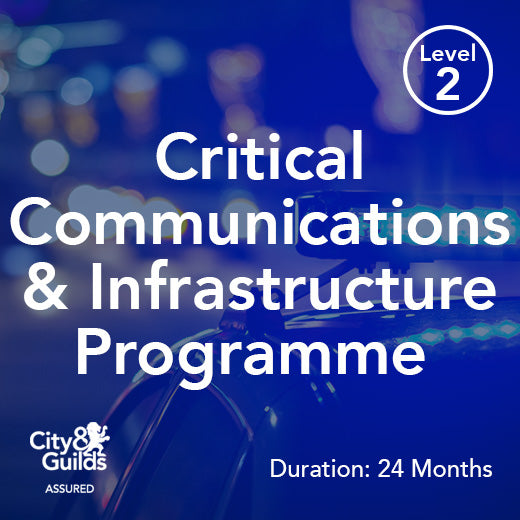
Critical Communications & Infrastructure Programme (Emergency Services Track)
The Critical Communications and Infrastructure Programme (Emergency Services Track) is a comprehensive programme designed to equip professionals in the Emergency Services with the essential knowledge and skills to excel in their roles. The programme aims to provide participants with a holistic understanding of critical communication technologies, strategic insights, and practical skills to navigate the complexities of the ecosystem. This programme has been assured by City & Guilds. Assured status provides validation and recognition for the learner. It is a symbol of learning excellence and quality and is a reassurance that the training undertaken meets best practice standards. Critical Communications & Infrastructure Programme (Emergency Services Track) Syllabus Foundation Courses Technology Fundamentals Course Modules: Defining Telecoms Background to the Telecom Network Digital Fixed Telecom Networks Data Networks Mobile Networks and Wi-Fi Broadband and Emerging Networks 2G to 5G Mobile Technologies Course Modules: Principles of Mobile Cellular Networks 2nd Generation Mobile Networks 3rd Generation Mobile Networks 4th Generation Mobile Networks 5th Generation Mobile Networks Radio Principles Course Modules: A Need for Radio Frequency and Bandwidth Modulation Radio Spectrum Antennas and Transmission Lines Propagation Radio Coverage Radio Interference Analogue and Digital Systems Specialist Courses LTE Mission Critical Communications Course Modules: Requirements of a Mission Critical Network The LTE Radio Interface Multimedia Broadcast Multicast Service The IP Multimedia Subsystem (IMS) Group Communication System Enablers Mission Critical Push to Talk Mission Critical Video Mission Critical Data LTE and LMR Interworking LTE Engineering Course Modules: Introduction to LTE OFDMA Physical Layer Access Stratum Protocols LTE UEs and Access Networks LTE Core Networks LTE Operation LTE Release 9 and Beyond 5G Engineering Course Modules: Introduction to 5G Principles of the 5G New Radio 5G Air Interface 5G Network Architecture 5G Procedures Releases 16 and 17 About City & Guilds City & Guilds is a household brand and a global leader in skills development. Over one million people earn a City & Guilds qualification every year, providing them with the skills they need to thrive in the workplace.In the global economy, the ability to compete depends on building a skilled, competent and confident workforce. City & Guilds understands the value of portable skills and globally recognised standards that enable people and organisations to succeed. It partners with Governments, employers and educators in over 50 countries, across five continents, to advise them on developing high-quality skills training that meets the needs of the global workforce, without compromising on local demands. Enrolment Fees: £2,995 (+VAT) Programme Duration: 24 months (Programme is On-Demand, learners can start at any time) Bespoke In-Company Schemes The Critical Communications and Infrastructure Programme provide the ideal structure for formalising training programmes for teams across your business. Contact us on info@wraycastle.com for more information.
£2,995.00
-
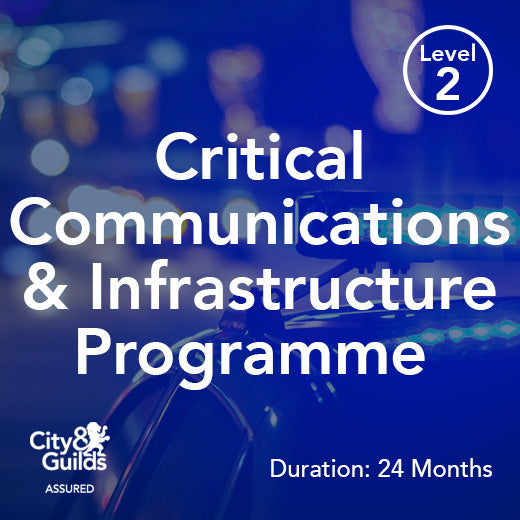
Critical Communications & Infrastructure Programme (Police Track)
Next Cohort: 12th January 2026 Build essential telecoms knowledge and skills to aid forensic investigations and provide expert witness testimony. The widespread use of mobile telephones has proven to be a useful source of information for law enforcement agencies. The ability to prove or disprove that a mobile device was used in the area of, or location of, a point of interest is invaluable. But to safely prove the case requires an understanding of cellular mobile technologies. The Critical Communications & Infrastructure Programme (Police Track) provides those working in Law Enforcement with a detailed understanding of the mobile network technologies of today and tomorrow, allowing them to conduct efficient investigations and provide compelling expert witness evidence in court. We have combined some of our most popular training courses to build a guided learning pathway that enables you to demonstrate your expertise and competence in modern telecom technologies. Who would benefit? Our Critical Communications & Infrastructure Programme (Police Track) has been designed for anyone working Law Enforcement from new starters looking to build their technical knowledge from the ground up to more experienced engineers looking to formalise and expand their knowledge base. Rigorous testing, regular digital badging and certification ensures that successful students are able to demonstrate the breadth and depth of their knowledge. This programme has been assured by City & Guilds. Assured status provides validation and recognition for the learner. It is a symbol of learning excellence and quality and is a reassurance that the training undertaken meets best practice standards. Critical Communications & Infrastructure Programme (Police Track) Syllabus Foundation Courses Technology Fundamentals Course Modules: Defining Telecoms Background to the Telecom Network Digital Fixed Telecom Networks Data Networks Mobile Networks and Wi-Fi Broadband and Emerging Networks 2G to 5G Mobile Technologies Course Modules: Principles of Mobile Cellular Networks 2nd Generation Mobile Networks 3rd Generation Mobile Networks 4th Generation Mobile Networks 5th Generation Mobile Networks Radio Principles Course Modules: A Need for Radio Frequency and Bandwidth Modulation Radio Spectrum Antennas and Transmission Lines Propagation Radio Coverage Radio Interference Analogue and Digital Systems Specialist Courses The TETRA System - An Overview Course Modules: Introduction to TETRA TETRA Services TETRA Network Components TETRA Network Architecture Air Interface Radio Procedures TETRA System Capacity Direct Mode Operation (DMO) Security Aspects of TETRA Radio Network Surveys Course Modules: Cellular Radio Principles GSM/UMTS/LTE/5G Networks Wi-Fi Radio Networks Radio Measurements Idle Mode Activity for Mobile Devices Connected Mode Activities for Mobile Devices Tools for Radio Surveys Guidance for Radio Network Surveys WiFi Engineering Overview Course Modules: Wireless LAN Technologies and Standards 802.11 PHY MAC Frame Structures MAC Procedures Security Wi-Fi Troubleshooting About City & Guilds Assured City & Guilds is a household brand and a global leader in skills development. Over one million people earn a City & Guilds qualification every year, providing them with the skills they need to thrive in the workplace.In the global economy, the ability to compete depends on building a skilled, competent and confident workforce. City & Guilds understands the value of portable skills and globally recognised standards that enable people and organisations to succeed. It partners with Governments, employers and educators in over 50 countries, across five continents, to advise them on developing high-quality skills training that meets the needs of the global workforce, without compromising on local demands. Enrolment Fees: £2,995 (+VAT) Programme Duration: 24 months (Programme is On-Demand, learners can start at any time) Bespoke In-Company Schemes The Critical Communications and Infrastructure Programme provide the ideal structure for formalising training programmes for teams across your business. Contact us on info@wraycastle.com for more information.
£2,995.00
-

Data Networks – An Overview (On-Demand)
Data networks form the backbone of all modern communication systems. Whether you're working in telecoms, IT, or a related field, a solid understanding of networking fundamentals is essential for navigating today’s connected world. This short, single-module course provides a clear and accessible introduction to how data networks operate, laying the groundwork for further study in networking, internet technologies, or telecommunications. In just three hours, you'll explore the foundational concepts of computer networking, starting with the purpose and structure of data networks and the key terms you need to know. You'll learn about how packet-switching enables efficient data transfer, how the Ethernet protocol supports local area networks, and how the TCP/IP model underpins communication across the internet. The course also introduces you to key internet operations and services, providing insight into how global connectivity is achieved and managed. Whether you're new to networking or seeking a refresher, this course gives you the essential knowledge you need to understand how data moves reliably and efficiently across modern digital systems.Designed for technical professionals and learners with little or no prior experience, this course is the perfect starting point for anyone looking to build confidence in the principles of data networking. Course Contents Background to Computer Networking Packet-Switching Principles The Ethernet Protocol TCP-IP Internet Operations and Services
£95.00
-

Developing and Communicating Compelling Customer Propositions (On-Demand)
For businesses to be successful, they need to align with their customers’ requirements in a number of key ways - but fundamentally it comes down to understanding the customer(s), creating compelling customer propositions, communicating those propositions, and enabling the value exchange. It encompasses product development, marketing and marketing communications, and business development / sales activities. This programme looks at the customer proposition holistically. It covers all the key elements needed to develop a sustainable business model that is tightly aligned with customer requirements, gets the right information in front of the right customers in an engaging and compelling way, and supports the overall strategy by delivering sustainable competitive advantage. We use exercises, case studies, break-outs and discussions to develop competencies and confidence, and the tools used will allow participants to apply the techniques to the workplace immediately. Topic Areas Include: Creating Compelling Customer Propositions Customers – Making Critical Choices Strategy and the Customer Proposition Customer Segments Products Brand Components of a Brand Pricing Expectation and Consistency The 80/20 Golden Rule Sales and Business Development Linking Marketing and sales – Lead Generation Sales – Common Objections Overcoming Common Objections Establishing a Sales Decision Process Responding to RFPs Telecoms Business Simulation Communicating Compelling Customer Propositions Channels to Market Key Elements of the Marketing Message The Psychology of Persuasion Segments, Profiles, Emotion Marketing Communications Online Marketing Marketing Systems and Frameworks Customer Retention and Loyalty Marketing Communications Plan Developing a Marketing Communications Plan Developing a Campaign for Lead Generation / Sales Assessing the Marketing and Communications Plan - KPIs International Marketing Market Research Marketing Resource
£95.00
-
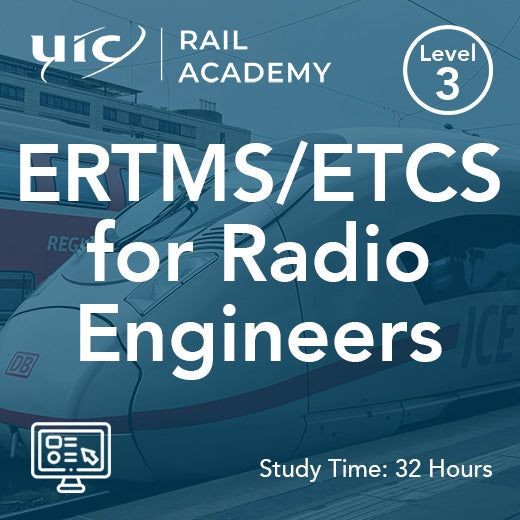
ERTMS/ETCS for Radio Engineers (On-Demand)
The European Railway Traffic Management System (ERTMS) is a crucial rail project in Europe, aiming to replace disparate train control systems with the European Train Control System (ETCS). Our 3-day training course provides an in-depth look at ETCS and focuses on utilizing GSM-R with or without GPRS as a bearer for ETCS signaling. This course is part of the UIC Rail Academy and is certified by the Institution of Railway Signal Engineers (IRSE). Participants in this course should have a basic understanding of GSM-R networks. Topics covered include ERTMS standards and legislation, system architecture, operating modes, protocols, circuit-switched signaling, GPRS for ETCS, radio network optimization, and more. Upon completion, attendees will have a comprehensive understanding of how GSM-R technologies can support the implementation of ETCS in railway systems. For those looking for a more flexible learning option, this course is also available as a self-paced online training course. Visit our website to learn more about how you can enhance your knowledge of ERTMS/ETCS for radio engineers at your own pace. This self-paced on-demand distance learning course features illustrated course books, videos, tests and full tutor support. Part of UIC Rail Academy. Prerequisites Delegates attending this course should be familiar with the principles of GSM-R networks. Topic Areas Include ERTMS Standards and Legislation Basic System Description System Architecture ERTMS Operating Modes ERTMS/ETCS Protocols Circuit Switched Signalling Circuit Switched Connections GPRS for ETCS The GPRS Air Interface GPRS Procedures Transmission through the Network Radio Network Optimization Certified by Institution of Railway Signal Engineers (IRSE) The Institution of Railway Signal Engineers (IRSE) certifies that the syllabus for the ERTMS/ETCS for Radio Engineers course is appropriate for meeting the stated objectives of that course. For more information about the scope of the certification process provided by the IRSE please see the IRSE website www.irse.org. On-Demand Online Training Our self-paced on-demand distance learning programmes are accessible on any computer, tablet or smartphone and allow you to study at a time and location that is convenient to you. Each course includes: Illustrated Course Books - featuring leading edge knowledge from subject matter experts. Videos - Detailed videos expand the points covered in the course books, discussing topics in greater depth. Tutor Support – Dedicated course tutors are available to answer any questions you might have throughout your studies. Formative Assessment - Modules include regular quizzes to support learning Certification– Successfully complete the end of module tests to to demonstrate the depth of your knowledge of the topic. Also available as a Live Online Training Programme, learn more.
£2,670.00
-
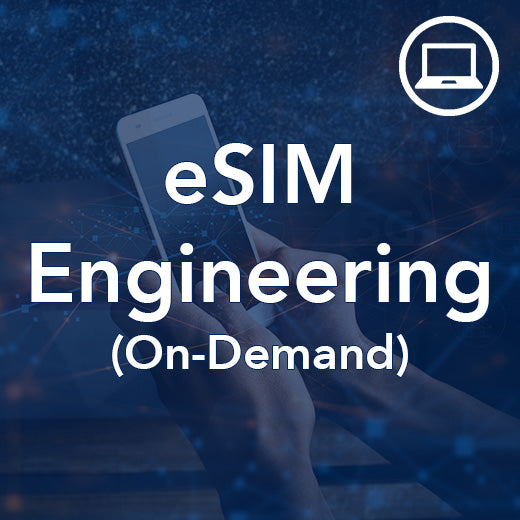
eSIM Engineering (On-Demand)
The eSIM Engineering Training Course offered by Wray Castle provides a comprehensive technical overview of eSIM technology and the latest remote SIM provisioning specifications from GSMA. This course delves into the transition of the SIM from physical to digital realms, exploring unique system architectures for both M2M and Consumer applications. Participants will gain insights into the evolution of eSIM technology and a glimpse into the future developments in this field. Engineers, product managers, and other professionals seeking to implement eSIM-based products and services within their organizations will greatly benefit from this course. A general engineering background with some knowledge of GSM SIM technology is assumed, and a basic understanding of mobile networks would be advantageous. The course covers essential topics such as the introduction to eSIM, GSMA Consumer eSIM Specification, GSMA M2M eSIM Specification, enhancements in the Consumer eSIM Specification, and the future prospects of eSIM technology. This self-paced on-demand distance learning course features illustrated course books, videos, tests and full tutor support. Who would benefit The course is intended for engineers, product managers and other staff who are looking to prepare for or actively roll out eSIM-based products and services within their organisations. Prerequisites A general engineering background with some knowledge of GSM SIM technology is assumed. A basic understanding of mobile networks would be desirable. Topic Areas Include Introduction to eSIM GSMA Consumer eSIM Specification GSMA M2M eSIM Specification GSMA Consumer eSIM Specification Enhancements The Future of eSIM
£1,815.00
-
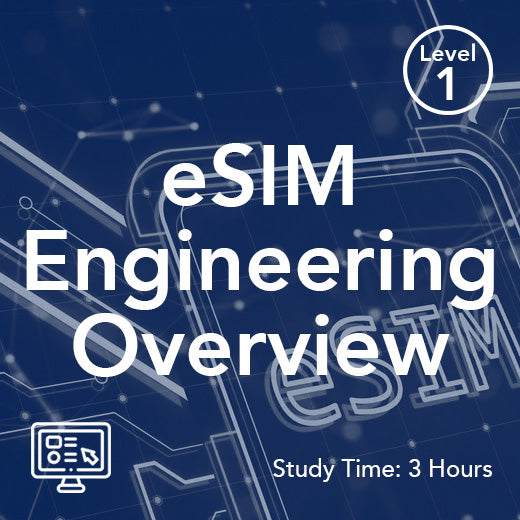
eSIM Engineering Overview (On-Demand)
Our eSIM Engineering Overview Training Course provides a comprehensive technical overview of eSIM technology and the latest remote SIM provisioning specifications from GSMA. This course delves into the role of the SIM, the transition from physical to digital, system architectures for both M2M and Consumer applications, the evolution of eSIM, and a glimpse into the future of this technology. Engineers, product managers, and other professionals seeking to implement eSIM-based products and services will benefit greatly from this course. Participants are expected to have a general engineering background with some knowledge of GSM SIM technology. While not mandatory, a basic understanding of mobile networks would be advantageous. The course covers essential topics such as Introduction to eSIM, GSMA Consumer eSIM Specification, GSMA M2M eSIM Specification, GSMA Consumer eSIM Specification Enhancements, and The Future of eSIM. This self-paced on-demand distance learning course features illustrated course books, videos, tests and full tutor support. Who would benefit The course is intended for engineers, product managers and other staff who are looking to prepare for or actively roll out eSIM-based products and services within their organisations. Prerequisites A general engineering background with some knowledge of GSM SIM technology is assumed. A basic understanding of mobile networks would be desirable. Topic Areas Include Introduction to eSIM GSMA Consumer eSIM Specification GSMA M2M eSIM Specification GSMA Consumer eSIM Specification Enhancements The Future of eSIM
£95.00
-

Essential 5G Protocols and Procedures (On-Demand Virtual Lab)
In this lab-based course, you will dive deep into the essential 5G protocols, with a specific focus on the 5G NF Framework, registration processes, and PDU session establishment. Through a series of interactive lab sessions, you'll gain invaluable experience and a comprehensive understanding of critical aspects of the 5G system.This course is tailored for individuals and organisations keen on mastering the operational intricacies of 5G systems. Whether you work for a public or private mobile network operator, network equipment vendor, test equipment vendor, handset manufacturer, regulator, or integrator, this course is universally relevant.This course is uniquely designed to be lab-based, ensuring that theoretical concepts are immediately put into practice. Through a series of interactive labs, participants will gain not only theoretical knowledge but also the practical skills necessary to navigate the dynamic world of 5G protocols and procedures. Course Structure Gain a comprehensive understanding of the 5G NF Framework, 5G registration and 5G PDU Session Establishment procedure’s including: 5G NF Registration Registration Message Flow Next Generation Application Protocol 5G AKA (Authentication and Key Agreement) Subscriber Data Handling AM (Access and Mobility) Policy Association 5G Session Establishment PFCP (Packet Forwarding Control) Protocol Who Would Benefit? The standardised nature of the lab makes it suitable for any organization interested in 5G System operation and function including. It is of particular interest to those in the following roles: Engineers working with Operation, Optimisation and Troubleshooting System Engineers and Integrators Or anyone who needs to explore and understand the 5G Core Network signalling Lab Features & Benefits Through a combination of hands-on experience and guided instruction our virtual labs allow users to explore signalling procedures in the 5G system. Our labs feature: A simulated 5G network - Provides hands-on experience and reinforces theoretical knowledge. Wireshark (pcap) output files – detailed output files provide deep system insight. Illustrated Course Books - featuring leading edge knowledge from subject matter experts. Videos - Detailed videos discuss topics in greater depth. Guided exercises for signalling scenarios - makes learning and applying new concepts straightforward. Ongoing trainer support - ensures you get expert advice when needed.
£1,140.00
-
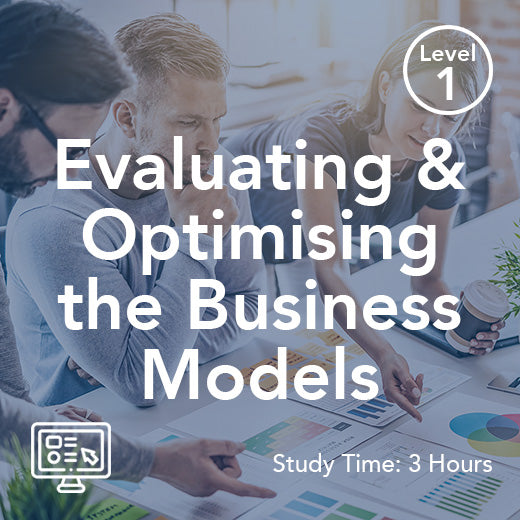
Evaluating and Optimising the Business Models (On-Demand)
Business models define a mix of activities required within a business to support a specific strategy. Collectively, one or more business models, aligned to a well-thought-out strategy, will deliver the competitive advantage needed to compete successfully in the market, and against any relevant competition. Business models are often complex, with multiple models running in parallel, and often in competition with each other within the business (in addition to the external competition). In this programme, we deconstruct the business model in order to fully understand its component parts before looking at how those parts can be optimally configured / reconfigured in order to maximise value creation and competitive advantage. We use examples, exercises and case studies to build a solid foundation that can be used within your own organisation to help drive success. Who Would Benefit? These programmes deliver comprehensive training for employees at all levels within the organisation. They would benefit employees, mid-senior managers, directors, specialists, consultants and identified talent. Topic Areas Include: Definitions and Components of a Business Model Business Model(s) – In the Bigger Picture Relationship - Strategy, Business Models and Operations Business Model Definition Understanding Value Extraction Developing The “Fit” of Activities – Examples Partnerships and the Business Model Customer Segments and Value Propositions Business Models – Options, Assessment and Development Understanding Value Business Model Disruption Business Model Adaptation Defining New Business Models Successful Examples for Redefined Business Models Business Models – The [Many] Options Explored
£95.00
-
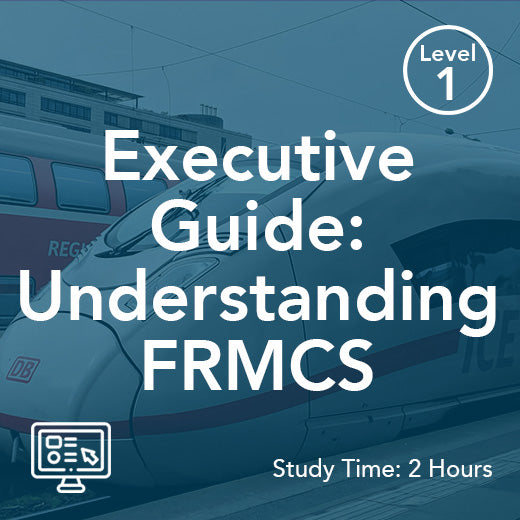
Executive Guide: Understanding FRMCS (On-Demand)
This concise executive briefing provides a high-level overview of the Future Railway Mobile Communication System (FRMCS), the next-generation communication standard for railways, is designed to assist executives seeking to understand the impact and opportunities arising from this new technology. The course explains what FRMCS is, the implication of some of the technical changes on the requirements for physical assets, why it is essential, and the implementation timeline for the migration from GSM-R. Participants will explore the architectural framework, key challenges in deployment, and the business opportunities it presents. Designed for busy executives, this course delivers practical insights in an accessible format.Prerequisites No prior knowledge of FRMCS, GSM-R, or telecommunications is required. This course is designed for those new to the topic, ensuring all acronyms are explained, and foundational concepts are introduced. Who Would Benefit Executives outside of rail companies charged with understanding the business impact or opportunity of FRMCS to their business, for example those already working in the railway ecosystem, those seeking business development opportunities in the rail sector, or those within the telecommunications sector seeking to explore the opportunity offered by FRMCS. Sales professionals preparing for client meetings or presentations involving railway communication systems. Business development / strategy development executives / managers exploring opportunities in the rail and telecom sectors. Policy-makers and regulators overseeing railway digitalisation efforts.Engineers and project managers who need a foundational understanding of FRMCS to support project planning or cross-functional collaboration. Course Contents Introduction GSM-R: The Context Why GSM Needs Replacement Introducing FRMCS FRMCS Challenges Stakeholders and Business Opportunities Timeline rail
£250.00
-

Fibre Optic Introduction (On-Demand)
Fibre optics are the foundation of today’s digital networks, enabling everything from high-speed broadband to 5G backhaul and critical infrastructure. This self-paced online course provides a clear introduction to fibre technology, covering both the benefits and the challenges of deployment. You’ll explore the fundamentals of light and optical transmission, fibre structures and cable types, as well as the tools and components used in real networks. Practical topics include splicing, termination, inspection, OTDR testing, troubleshooting, and safety best practices. The course combines expert-written study guides, video tutorials, and regular quizzes to reinforce learning, with certification available through a digital badge awarded for successful completion. With two structured modules – Fibre Optic Networks: Building Blocks and Fibre Optic Networks: Testing and Troubleshooting – this course is ideal for newcomers to fibre optics or professionals seeking a solid technical grounding. Course Contents Fibre Optic Networks: Building Blocks Fundamentals of Light Propagation Fibre Optic Basics Optical Cable Types and Applications Fusion and Mechanical Splicing Optical Connectors and Fibre Termination Passive Optical Components Active Optical Components Fibre Optic Networks Fibre Optic Networks: Testing and Troubleshooting Connector Inspection and Cleaning Optical Power Meter and Light Source Optical Time Domain Reflectometer Optical Network Troubleshooting Safety Best Practices
£995.00
-
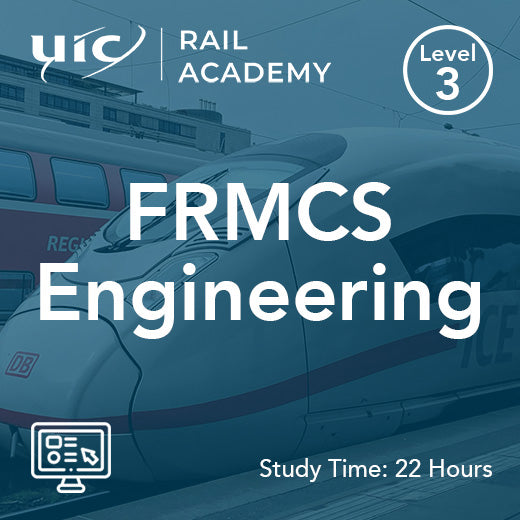
FRMCS Engineering V2 (On-Demand)
GSM-R end of life is anticipated to be around 2030 which only leaves a few years to find a replacement system. The International Union of Railways (UIC) have published a document called FRMCS- Future Railway Mobile Communications System which outlines what will be required of a future system. The railway community have detailed the communications requirements of the future railway networks and are looking for telecommunications manufacturers and standards bodies to provide a suitable solution. This technical course is aimed at engineers planning to deploy FRMCS as a successor to GSM-R. It identifies the specifications for FRMCS, the design aims, architecture of the On-Board systems, trackside systems and the transport network. Additionally, the course details the capabilities of FRMCS, operational procedures and looks at possible migration scenarios with GSM-R. Now fully updated to include FRMCS V2 specifications. Prerequisites Attendees ideally will have a background in telecommunications gained from working in the railway industry and have technical knowledge of GSM-R. Who would benefit? The course is open to anyone that would like to gain an insight into how mobile telecommunications for railways may migrate from GSM-R to the system known as FRMCS. This self-paced on-demand distance learning course features illustrated course books, videos, tests and full tutor support. Topic Areas Include FRMCS – An Introduction FRMCS Reference Architecture FRMCS On-Board Architecture FRMCS Trackside Components Voice Application Subsystem FRMCS Location and Positioning System 5G FRMCS Addressing The SIP Core Mission Critical Architecture and Procedures FRMCS Operation Radio Planning and Migration MCVideo Certified by Institution of Railway Signal Engineers (IRSE) The Institution of Railway Signal Engineers (IRSE) certifies that the syllabus for the FRMCS Engineering course is appropriate for meeting the stated objectives of that course. For more information about the scope of the certification process provided by the IRSE please see the IRSE website www.irse.org.
£2,275.00
-
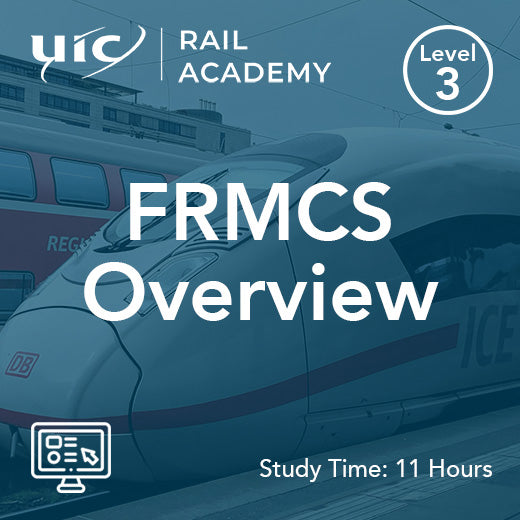
FRMCS Overview V2 (On-Demand)
This course is aimed at non-technical people or those in management roles that need an introduction to FRMCS. It outlines the need for FRMCS and introduces the standards that are required. The course also discusses the issues with the current radio spectrum allocations and how FRMCS and GSM-R may co-exist in the rollout phase. Also discussed the technology known as 5G that will be an integral part of FRMCS. Now fully updated to include FRMCS V2 specifications Part of UIC Rail Academy Course Contents FRMCS – An Introduction FRMCS Reference Architecture 5G Mission Critical Architecture and Procedures Radio Planning and Migration MCVideo Certified by Institution of Railway Signal Engineers (IRSE) The Institution of Railway Signal Engineers (IRSE) certifies that the syllabus for the FRMCS Overview course is appropriate for meeting the stated objectives of that course. For more information about the scope of the certification process provided by the IRSE please see the IRSE website www.irse.org. Also available as an instructor-led course, learn more
£1,218.00





























































